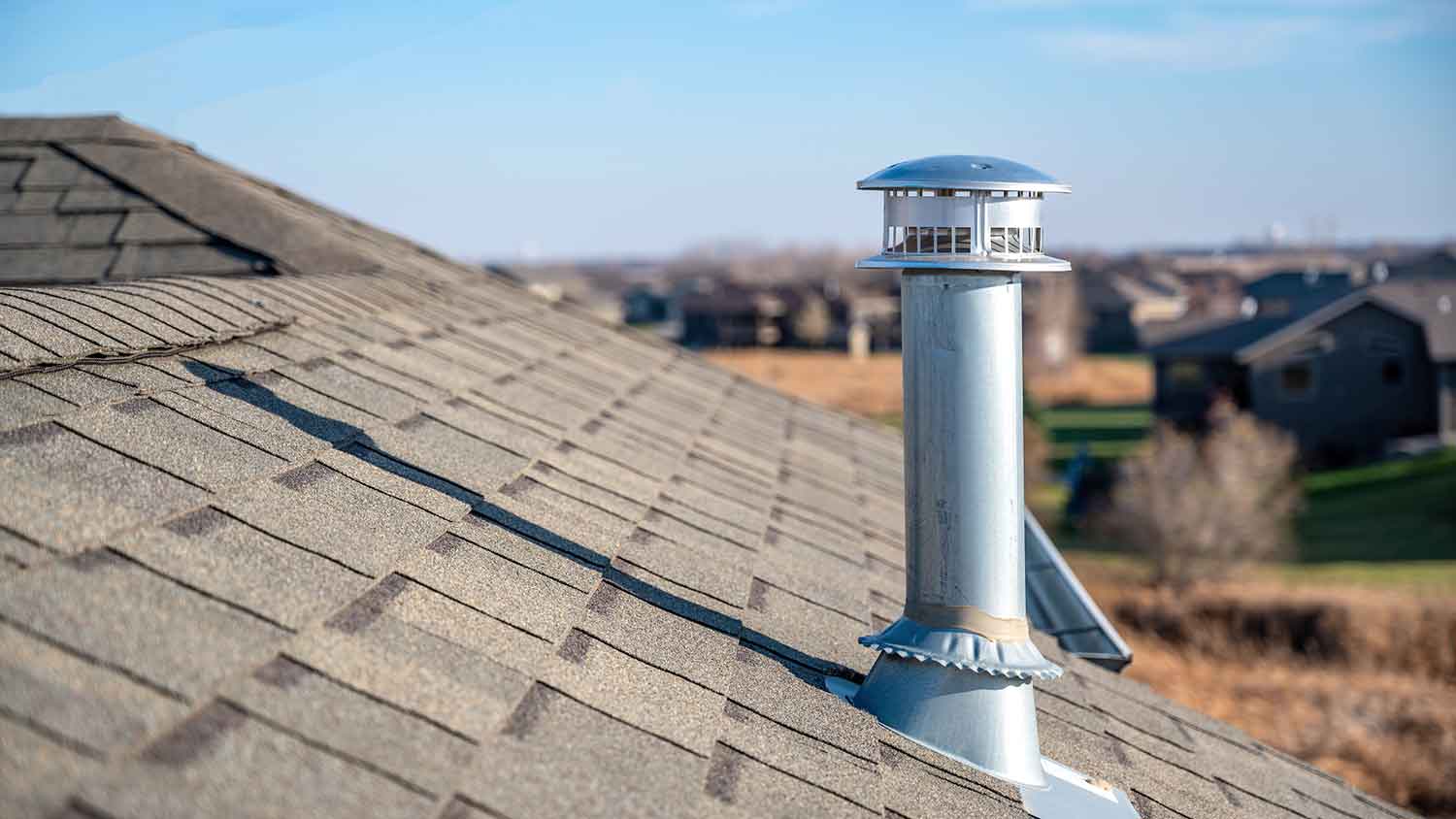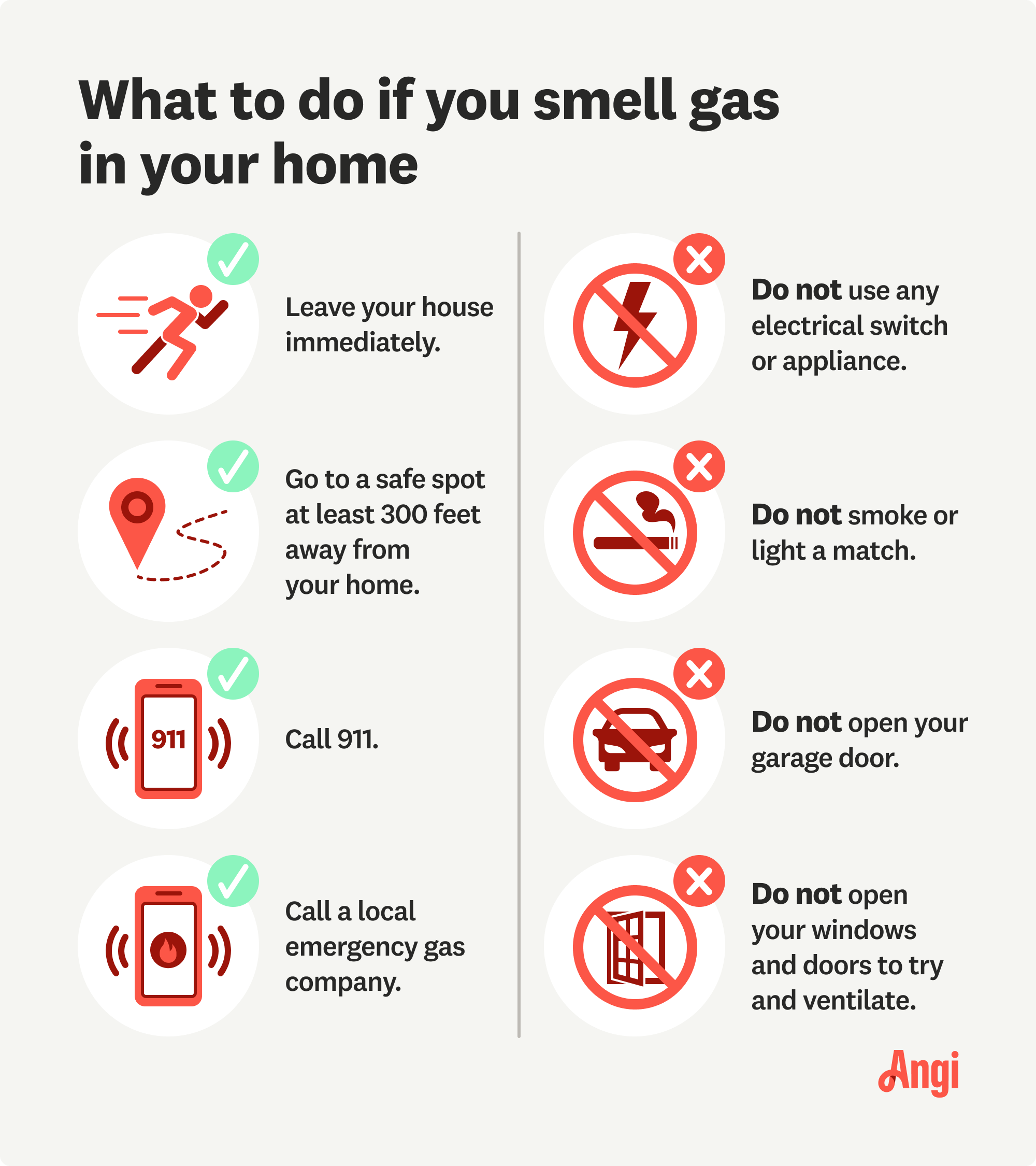
A blower door test can identify air leaks in your home and help boost energy efficiency. Use this blower door test cost guide to see what your test will total.
You really can blame it on your furnace this time


A gas smell might emanate from a furnace when first used for the season.
A persistent smell could indicate a malfunctioning part, or worse—a gas leak.
You should always call a pro about gas furnace maintenance for peace of mind.
Is your gas furnace stinking up the place? You’re right to be concerned whenever you recognize the rotten egg-like stench of gas in your home. That bad smell isn’t always bad news. But you might wonder what exactly is going on when your furnace smells like gas—and what you should do to ensure it’s working safely.
The quick answer to this question is yes, even a normally functioning gas-powered appliance will smell like gas from time to time.
However, a strong or persistent gas smell in your home could indicate something more serious, and it’s worth your health and peace of mind to get it checked out. Schedule your yearly furnace maintenance call before the cold season arrives so you can mitigate issues before temperatures drop and you need to get cozy and warm.
We hate to sound like a broken record, but if there’s any concern about the operation of a gas-powered appliance in your home, call a pro. But here are some of the major reasons—some you can ignore but some you absolutely shouldn’t—your furnace smells like gas.

During the warm weather months when your furnace is in hibernation, it’s collecting dust. That gas smell you experience when you fire it up for the first time when the weather starts to get cool is probably just dust burning off. The smell of gas coming from the furnace—and potentially through the air ducts and vents—results from mercaptan reacting with the burning dust particles.
Mercaptan is an organic gas made of carbon, hydrogen, and sulfur—that last one is what creates the rotten egg smell—that’s added to the natural gas to make it more detectable because it’s odorless in its natural state. So mercaptan is helpful in a way, though your nose might not appreciate it.
There is a solution to prevent a strong gas smell, though. Before you fire up your furnace for the season, clean it off so that there’s less dust to burn off.
Level of concern: None, unless the smell of gas persists past the initial one or two uses.
To ensure a smoother and safer start to your heating season, consider scheduling a professional furnace inspection and cleaning before the cold weather arrives. A technician can thoroughly clean your furnace, removing any accumulated dust and debris, which will help minimize that gas smell from the furnace. Regular maintenance not only reduces unpleasant odors but also enhances the efficiency and longevity of your furnace.
Your furnace pumps heat out in 10 to15 minute cycles. When it fires up at the start of each cycle, it’s normal to smell a bit of gas, especially if you’re standing nearby. Depending on how cold it is, there might be two or three cycles per hour as the furnace works to adjust the temperature in your home. The gas smell should dissipate soon after the start of each cycle, so it should be no problem.
However, if your furnace is experiencing a malfunction known as short-cycling, you might smell gas more often because the furnace keeps having to fire up. If you believe this to be the case with your furnace, it’s time to make a service appointment with a local HVAC pro.
Level of concern: None, unless you suspect your furnace is short-cycling—call a pro to fix it.
When your furnace smells like gas, you should monitor its behavior closely for a while. If the short-cycling issue persists or the gas smell continues beyond the initial startup, contact a certified HVAC technician as soon as possible. They can diagnose the problem and recommend necessary repairs to prevent potential hazards and ensure your furnace operates efficiently. Regular maintenance checks can also help prevent future short-cycling issues.

A well-functioning furnace exhaust pipe is supposed to send the smell of gas out of your home. High-efficiency furnaces do this best, but even they are not foolproof. In general, the odor of mercaptan should fade quickly, but a malfunctioning pipe could send the exhaust right back into your home.
Level of concern: Elevated. Call a pro to have your exhaust pipe checked and repaired or replaced, as necessary.
First, check for any visible damage or obstructions in the exhaust pipe. If you're unsure or can't identify the problem, it's best to contact a professional HVAC technician to inspect and repair the components of your HVAC system. Ignoring this issue could lead to serious safety hazards, so take immediate action.
If the heat exchanger is cracked because of overheating, it won’t burn off all of the gases during combustion. In addition to those unburned gases, your furnace will also create carbon monoxide, known as the “silent killer” for its odorless yet deadly presence in your home. Time to call a pro.
You might also see soot. This means that your heat exchanger and other components are corroding.
Level of concern: Moderate to high alert. It’s not an ideal situation, so you should call in a pro to take a look.
Install carbon monoxide alarms on every level of your home, in central locations, and outside bedrooms. Check all of your carbon monoxide detectors every month, and replace the batteries on a set schedule according to the manufacturer’s instructions.
If you notice soot buildup or suspect a cracked heat exchanger, shut down your furnace immediately and contact a licensed HVAC technician. Operating the furnace in this condition can expose your household to carbon monoxide, which can be deadly. The technician will need to inspect the heat exchanger and replace it to restore safe operation. Prioritize this repair to protect your home's safety.

Again, if not for the addition of mercaptan, gas is odorless in its natural state. If you see a yellow flame instead of a blue one inside your furnace, there’s cause for concern. It might just be dust or dirt burning off, but it could be an indicator of incomplete combustion.
If you hear hissing sounds near your furnace, this could mean there’s a faulty connection somewhere that’s permitting gas to flow back into your home. Do you have houseplants that are in failing health even though you’re taking good care of them? You might have a gas leak in your home.
Level of concern: High alert. Seek safety outside your home and call your gas company to report the potential leak.
Leave your home and avoid using any electrical devices, including light switches, because they can ignite the gas. Once you're safe, call 911 and a local gas company, but do not start your car. Wait for everyone to arrive and inspect your home for harmful gases. They will locate and repair the leak, ensuring your home is safe before you return.
It goes without saying that whenever you are concerned about the performance of a large appliance or system, call your local furnace repair company to have it checked out. A yearly service call can ensure that your furnace is working properly and won’t cause any issues when the temperature drops.
Project involved cutting down a Holly tree and trimming another tree on my property. Great customer service and responsiveness in bidding for and competing the project.
Jade and her team cleaned my home on Christmas Eve! They worked so hard and left everything sparkling and super clean. Thank you so much and Happy Holidays!!
I have used Eric on several occasions. Each and everytime he goes above and beyond to ensure that the job is done right. Even taught me a few things to help maintain my system. Iâ ll never call another tech again.
They were very reliable and cudious. They took care of all my needs. I had a couple extra things that needed to be done and they took care of it! They showed up on time and were very professional.
Harris Heating & Cooling have replace several furnaces and air conditioners for rental houses that I own. They provide a good price and a quick turnaround for their work.
They were very polite and did the job correctly , thanks up and away junk removal
We bought our furnace and air conditioning system from Click almost 15 years ago and they have been providing service since. They always does an outstanding job. They are consistently on time, conscientious, personable, and very reasonable in their pricing. And in the rare circumstance where...
Job was completed without any problems.
Very informative and detailed. Parts we needed not in stock we just couldn’t wait due to extreme heat conditions. Other than that I would highly recommend
From phone call to service time, this group was fast! They sent out one of their most seasoned technicians to look at our AC. He was able to fix the issue and provided quotes for a new system on the same day. I would highly recommend True Blue for your heating and air needs.
From average costs to expert advice, get all the answers you need to get your job done.

A blower door test can identify air leaks in your home and help boost energy efficiency. Use this blower door test cost guide to see what your test will total.

Furnace cleaning is an essential annual chore to keep your home safe. Find out common furnace cleaning costs by type and size of furnace with this guide.

Repairing ductwork in a crawl space is frustrating and difficult, which is reflected in the cost. Learn why limited access results in a premium cost beyond just a simple increase in labor hours.

Energy bills rising? Here’s how to perform a DIY duct leakage test to locate any damage in your ductwork and restore your energy-efficient home.

Ductwork losing energy? Here are six duct sealing methods that will help you get some big savings on your monthly energy bills.

If you’re thinking about an alternative to a traditional HVAC system, you may want to consider a heat pump. Read on for more about heat pump systems.